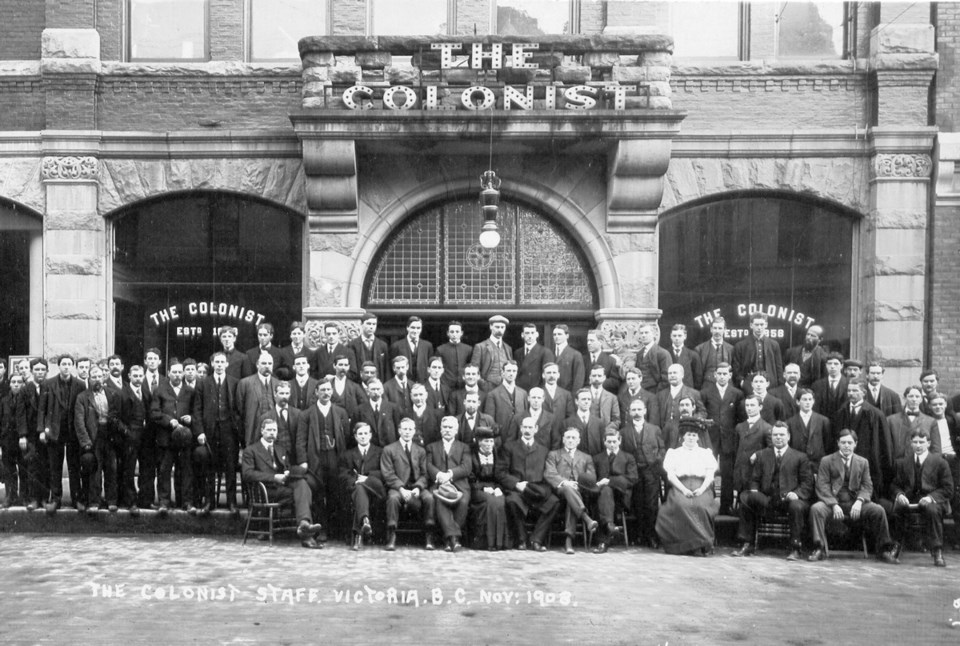When Amor De Cosmos started publishing the weekly British Colonist 160 years ago, his goal was to make the community a better place — and in his mind, to do that he would have to deal with the colonial governor, James Douglas.
De Cosmos used his publication as a vehicle to challenge Douglas, and to give a voice to the people living in the colony of Vancouver Island. He was driven by his conviction that conditions could be made better for everyone, and he believed in his goal of informing the public.
He was hardly alone in his thinking; many newspapers have been founded because the proprietors wanted to help readers better understand current events, as well as future potential.
We also respect the goals of De Cosmos in another way: We continue to be a watchdog of government for the governed, no matter which party or politician is in power. We’re not alone in that goal, as other newspapers see the same responsibility.
Some examples: The full story on the Health Ministry firings would not have been told if the Times Colonist and the Vancouver Sun had not kept pressuring the provincial government for answers. Access to court records across the province would still be spotty if not for the efforts of Times Colonist reporters; we won an award for legal journalism for that effort.
The Times Colonist won the Michener Award — the highest honour in Canadian journalism — for its reporting on a British Columbia government policy which reduced support for people with development disabilities. As a result of our work, the provincial government reversed its policies, gave a substantial increase in financial support for those with developmental disabilities, and made changes in the Ministry of Social Development and in Community Living B.C.
A weeklong series in the Times Colonist revealed how government policies, overcrowding, poor construction and a lack of oversight contributed to the deplorable conditions of First Nations housing on Vancouver Island. Following the publication of the articles, the federal government pledged $50 million for native housing.
And remember all of the missing women on Vancouver’s Downtown Eastside? Determined reporters such as Lindsay Kines pushed and prodded until finally the police took the disappearances seriously.
We can’t expect Google or Facebook to keep a check on politicians or government agencies, can we? They invest nothing in news coverage, even as they grab the advertising revenue that for decades has kept local reporters employed.
But public service comes in many forms; it is not always about holding the government’s feet to the fire. Consider some of the community projects that exist because of the Times Colonist.
Since we founded it in 1998, our annual book drive has contributed more than $5 million to literacy projects in our readership area. It has also helped you clear old books from your home, and replace them with old books from someone else’s home.
Our annual Christmas fundraising efforts make the holiday season a bit brighter for those in need. It was started by the Daily Colonist in 1956. Money raised is distributed through agencies such as the Mustard Seed Street Church and the Salvation Army.
We sponsor the most popular 10-kilometre running race on the Island. We stepped up to be the primary sponsor of the area’s most important golf tournament 15 years ago, saving it from cancellation, and we continue to be involved.
We have been taking an active role since our earliest days. Our two founding newspapers had a wide variety of promotional ideas though the years, everything from erecting the world’s largest totem pole to encouraging swimmers to cross Juan de Fuca Strait.
We have sponsored sports events of just about every size and description: Someone in your family might have a Colonist Cup from the 1920s. We’ve even enlisted people who claimed to be able to make it rain — just doing our bit to help Greater Victoria make it through a dry summer.
And of course, one of the greatest ways that we can help our community is through our columns. We can provide a level of exposure that is simply not possible elsewhere. That’s always been the case with newspapers, but our reach has grown with the rise of the internet.
There have been many changes at the Times Colonist over the years. De Cosmos printed the first copies of this newspaper on a sheet-fed flatbed press; this year, we have turned off our presses and shifted printing to the Ladysmith plant owned by Black Press.
Producing a newspaper has never been easy, as De Cosmos’s first issue of the British Colonist, on Dec. 11, 1858, showed.
Near the bottom of the last page he printed a tiny notice headed “Apology,” in which he explained that “owing to causes beyond our control, many items of interest have been deferred, and our paper delayed.”
De Cosmos promised to do better — and he did. One hundred and sixty years later, this newspaper remains committed to doing better, every day.
It’s a legacy we’re proud to carry on.
Dave Obee is the editor-in-chief and publisher of the Times Colonist.



